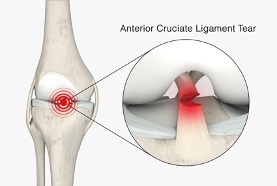The anterior cruciate ligament (ACL) is the strong ligament in the middle of the knee that stops the tibia (the shin bone) from wobbling forwards, and, importantly it also helps provide rotational stability to the knee for cutting and pivoting type manoeuvres. So, when your knee goes 'snap', or 'pop' there is a good chance that something fundamental has happened to your ACL. It is one of the most feared injuries as it can utterly debilitate normal movement.
the classic ‘pop’ or ‘snap’ in the knee
 In his article ACL tears: get diagnosed QUICK!, Consultant Knee Surgeon, Mr Ian McDermott from The London Sports Orthopaedic Clinic, says, "The ACL is a common injury amongst footballers, skiers and netball players, particularly if one twists too hard on a bent knee: this then gives the classic ‘pop’ or ‘snap’ in the knee, normally with severe pain, and the knee gives way followed by the joint then swelling up significantly."
In his article ACL tears: get diagnosed QUICK!, Consultant Knee Surgeon, Mr Ian McDermott from The London Sports Orthopaedic Clinic, says, "The ACL is a common injury amongst footballers, skiers and netball players, particularly if one twists too hard on a bent knee: this then gives the classic ‘pop’ or ‘snap’ in the knee, normally with severe pain, and the knee gives way followed by the joint then swelling up significantly."
Ian goes onto advise that, "ACL tears occur frequently in athletes and those involved in contact sport, and an ACL tear can be a fairly devastating injury to a sportsperson, in terms of the time off sport that is then required." He emphasises:
ACL tears are common: if you even think ‘ACL’ then assume ACL… until proven otherwise!
Access to rapid knee treatment is critical
Ian describes the experiences that many patients are currently facing with delays to treatment caused by the response to the coronavirus resulting in the record NHS waiting lists. This is not a good situation for anyone and is particularly worrisome if there is a ACL tear.
Pain and immobility aside, the longer you leave a wobbly unstable ACL-deficient knee, then the bigger the risk is of the patient then developing meniscal cartilage tears in their knee, the lower the chance is of any meniscal tears actually be repairable, and also the higher the chance of the patient’s knee developing serious articular cartilage damage: all of which significantly adversely affect outcomes, the long-term health of the knee and the risk of future knee arthritis.









